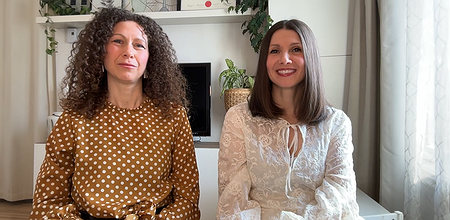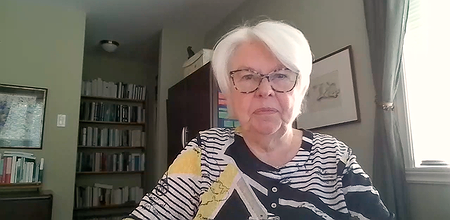- Determining if starting your own business is for you and finding a suitable personalized formula
- Defusing typical fears encountered by those wishing to start a private practice
- Providing practical information about key aspects of starting a private practice
Starting and managing your private practice in psychology
Dr. Valentina Munoz, Psychologist
All the tools so you can concentrate on what matters most: your clients.
Excerpt: starting a private practice
- 4h of continuing education
- 25 lessons that last from 5 to 15 minutes each
- 1 certificate of achievement
- 1 power-point
- 1 bibliography
- 1 course evaluation
- 7-day money back guarantee
- Unlimited access
- 88% of participants who completed the satisfaction survey declare they would recommend this course to a colleague
Overview
Most professionals in helping roles will be self-employed at some point in their career. This training is designed to cover the essential topics related to private practice. You will discover what type of entrepreneur you are and how to build on your strengths. This training will also cover the different types of private practice structures so you can evaluate which one is right for you. In addition, basic legal and financial aspects will be presented and explained with concrete examples. This training will then focus on how to manage and administer your private practice, and necessary forms to get started will be put at your disposal. Finally, tips and tricks will be presented so you can maintain a healthy balance while being your own boss.
The main objective is to give you a toolbox to start, maintain, or modify your private practice as needed.
Accreditation
Collège des médecins du Québec
For physicians who practice psychotherapy, training recognized by the Ordre des psychologues du Québec is automatically considered as activities adopted by the Collège des médecins, in accordance with Article 3 of the Regulation.
For physicians who do not practice psychotherapy, the College evaluates each recognition request based on the following criteria:
- the relevance of the activity to the practice of the profession
- the skills and experience of the trainer
- the quality of the content and its adequacy with the physician's practice
- the pedagogical framework of the activity
- the quality of the documentation provided
- compliance with the training objectives set out in the regulation
- the presence of a certificate of participation or an evaluation
About the expert

Dr. Valentina Munoz, psychologist, is a clinical psychologist specializing in cognitive-behavioral therapy (CBT) for treating anxiety and stress-related issues in adults. She earned her PhD in clinical and research psychology from Université de Montréal, Canada, in 2005.
With extensive experience in private practice, Dr. Munoz provides psychotherapy and offers workshops for both the general public and mental health professionals. Her work focuses on anxiety disorders, burnout prevention, resilience, and stress management.
Dr. Munoz spent 10 years at the Douglas Mental Health University Institute, where she treated individuals with severe anxiety disorders and complex co-occurring issues, while also supervising PhD psychology interns. She has also served for many years as an external resource for the Canadian Armed Forces, supporting veterans coping with PTSD.
Valentina Munoz is a licensed member of the Ordre des Psychologues du Québec and is fluent in French, English, and Spanish.
Learning objectives
Learning material
This workshop includes theory as well as clinical examples. It includes videos ranging from 5-15 minutes in length. The PowerPoint of the workshop can be downloaded.
Syllabus
- PowerPoint
- 1. Presentation
-
Theme 1: What type of entrepreneur are you?
- 2. Self-knowledge (Your strengths, chalenges, and entrepreneurial qualities)
- 3. Assessing entrepreneurial and personal profiles
-
Theme 2: What type of private practice should you choose?
- 4. Turnkey office and subletting with colleagues
- 5. Solo rental, opening your clinic and practicing at home
- 6. Webtherapy
- 7. Office search- outdoor and indoor factors
- 8. Space and layout of your office
- 9. Dress code and key messages
-
Theme 3: What legal aspects should you consider?
- 10. Different business legal structures
- 11. Company name and trademark
- 12. Insurance, membership and key messages about legal issues
-
Theme 4: What about your finances?
- 13. Private vs public fees
- 14. Fees and revenues of a private practice
- 15. Taxes and finances takeways
- Handout - Forms
-
Theme 5: How to manage the administrative side?
- 16. Forms and progress notes
- 17. Managing the practice
- 18. Referrals
- 19. Websites and key messages of administration
-
Theme 6: How to manage my daily practice
- 20. First contact and managing appointments
- 21. First session, session structure and general record keeping tips
-
Theme 7: How to maintain a healthy balance
- 22. Self-assertion
- 23. Boundaries and anticipating challenges
- 24. Tips and tricks about balance
- 25. Conclusion
- Bibliography
CE Credits
Download a certificate of successful completion.
Audience
This training is intended for mental health professionals.
Registration
Ask a question
Do you have a question? Then email us at contact@asadis.net
Frequently asked questions
-
Is there an evaluation at the end of the course?
To validate the achievement of the learning objectives, a final evaluation in the form of true/false questions is required. It must be completed in order to obtain the certificate of completion.
In addition, an optional self-assessment is offered at the beginning and end of the course, allowing you to measure your progress on the targeted skills.
These evaluations are not graded and are intended primarily to support your professional reflection.
-
I have a disability. Can I receive specific support?
Yes! This training is offered as a pre-recorded video format, without subtitles. If you have a disability, we can provide an adapted alternative (technical assistance for viewing or individual supervision). For any request, please contact our disability coordinator at the following address: contact@asadis.net
-
How long do I have access to the course?
After your registration, the course is accessible anytime and from anywhere with unlimited access.
-
When does the course start?
That is entirely up to you! When you buy a course, you'll receive an access link that you can activate when you want.
-
Is there a student rate?
Yes there is! To learn more, email us at contact@asadis.net.
You may also be interested in:
Legal notice
The courses offered by ASADIS are accredited by different professional organisations. In addition, ASADIS is approved by the Canadian Psychological Association to offer continuing education for psychologists. ASADIS maintains responsibility for the program.
The CPA’s approval of an individual, group, or organization as a CE Sponsor or Provider is restricted to the activities described in the approved application or annual report form. The CPA’s approval does not extend to any other CE activity the Sponsor or Provider might offer. In granting its approval, the CPA assumes no legal or financial obligations to Sponsors, Providers, or to those individuals who might participate in a Sponsor or Provider’s CE activities or programs. Further, responsibility for the content, provision, and delivery of any CE activity approved by the CPA remains that of the CE Sponsor or Provider. The CPA disclaims all legal liability associated with the content, provision, and delivery of the approved CE activity.




